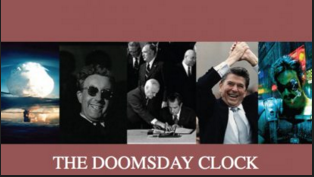January 24, 2019 International Daybook Calendar & News Advisory
“DOOMSDAY CLOCK” UPDATE SCHEDULED FOR JANUARY 24th IN WASHINGTON, D.C.
By Max Karlin From prnews2.com
Key Question: Have Things Improved Enough to Move Hands of Clock Away From Midnight? Announcement Comes As Nuclear, Climate, and Technology Issues Dominate the World Stage.
WASHINGTON, D.C. – NEWS ADVISORY – The Bulletin of the Atomic Scientists will host a live international news conference at 10 a.m. EST/1500 GMT on Thursday, January 24th, 2019 to announce whether the minute hand of the iconic “Doomsday Clock” will be adjusted. The decision is made by the Bulletin of the Atomic Scientists’ Science and Security Board in consultation with the Bulletin’s Board of Sponsors, which includes 14 Nobel Laureates.

The factors contributing to the decision about the Doomsday Clock time will be outlined on January 24th.
In January 2018, the Doomsday Clock’s minute hand was set forward by 30 seconds, to two minutes before midnight, the closest it has been to apocalypse since 1953 in the early years of the Cold War. The Doomsday Clock’s movement in 2018 was influenced in large part by the failure of world leaders to respond effectively to the looming threats of nuclear war and climate change. Previously, the Clock was moved from three minutes to midnight to two and a half minutes to midnight in January 2017. Now, the question is whether or not circumstances have improved sufficiently to start moving the minute hand away from midnight.
News event speakers for the Doomsday Clock announcement on January 24th, 2019 will include:
- Rachel Bronson, president and CEO, Bulletin of the Atomic Scientists;
- Former California Governor Jerry Brown, executive chair, Bulletin of the Atomic Scientists;
- Former U.S. Secretary of Defense William J. Perry, chair, Bulletin of the Atomic Scientists Board of Sponsors;
- Robert Rosner, William E. Wrather Distinguished Service professor in the Department of Astronomy and Astrophysics and Physics at the University of Chicago, and chair, Bulletin of the Atomic Scientists Science and Security Board;
- Sharon Squassoni, research professor of practice, Institute for International Science and Technology Policy, Elliott School of International Affairs, The George Washington University, and member of the Bulletin of the Atomic Scientists Science and Security Board for nuclear risk;
- Susan Solomon, atmospheric chemist, National Oceanic and Atmospheric Administration and Ellen Swallow Richards professor of Atmospheric Chemistry & Climate Science at Massachusetts Institute of Technology, and member of the Bulletin of the Atomic Scientists Science and Security Board for climate change; and
- Herb Lin, senior research scholar for cyber policy and security, Stanford University, Hank J. Holland fellow in Cyber Policy and Security, Hoover Institution at Stanford, and member of the Bulletin of the Atomic Scientists Science and Security Board for cyber/disruptive technologies.





